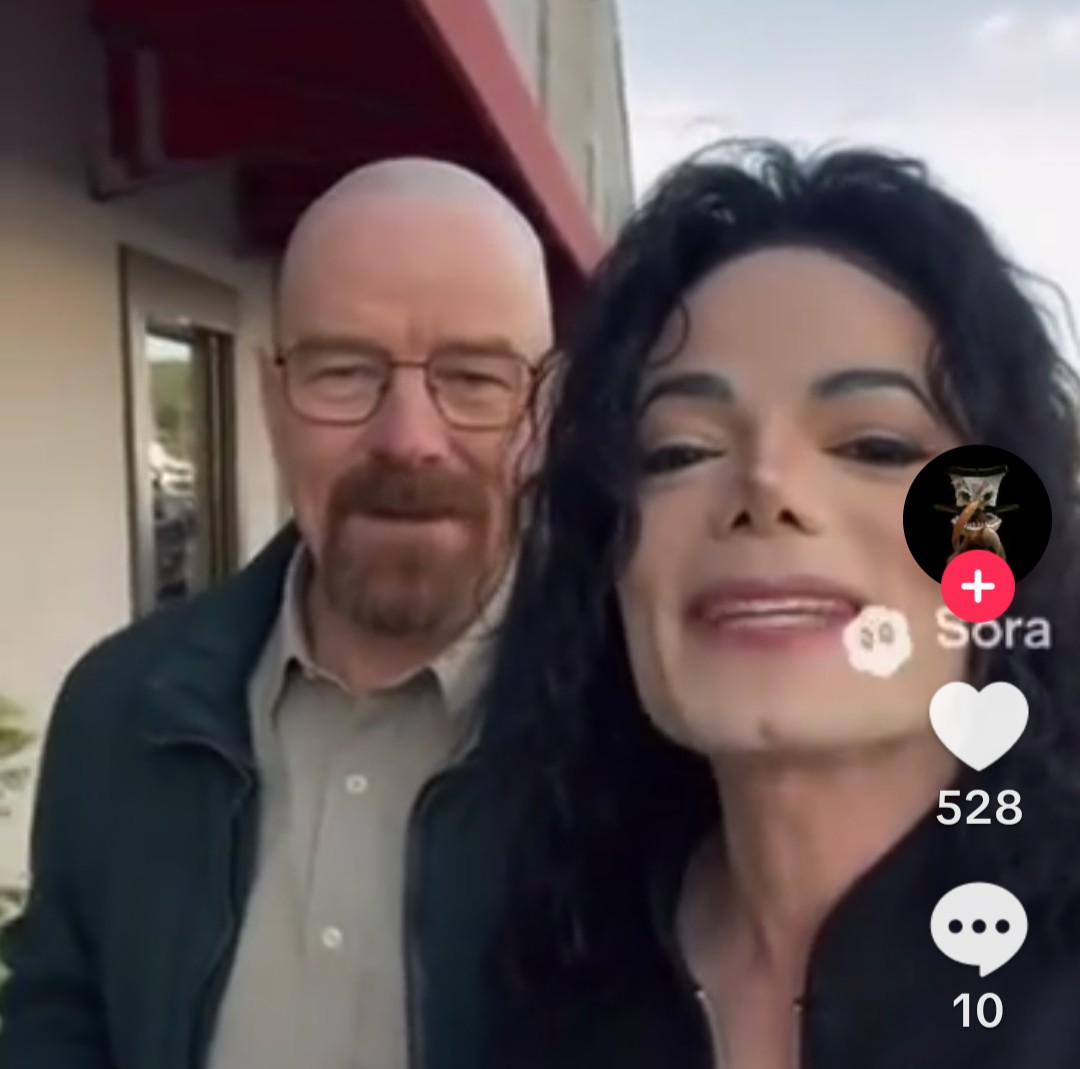
La continua generazione di videoclip con attori famosi pubblicati senza il loro consenso sulla piattaforma Sora 2 ha nuovamente attirato l’attenzione sui problemi associati all’utilizzo di reti neurali per creare copie digitali di persone.
Dopo che il servizio di OpenAI ha pubblicato video generati con Bryan Cranston, tra cui un video con Michael Jackson, l’azienda ha annunciato che avrebbe rafforzato i controlli sull’utilizzo delle immagini e delle voci di personaggi famosi.
Lo stesso Cranston, il sindacato degli attori SAG-AFTRA e diverse importanti agenzie (United Talent Agency, Creative Artists Agency e Association of Talent Agents) hanno rilasciato una dichiarazione congiunta. Hanno sottolineato che OpenAI ha riconosciuto la generazione indesiderata e ne ha espresso rammarico. In risposta alle critiche, l’azienda ha ribadito il suo impegno nei confronti del principio di partecipazione volontaria alla creazione di copie digitali: nessun artista o performer dovrebbe apparire in tali video senza previa autorizzazione. Ha inoltre promesso di rispondere tempestivamente ai reclami relativi alle violazioni di questa politica.
Sebbene OpenAI non abbia divulgato i dettagli delle modifiche apportate all’app Sora, l’annuncio in sé ha rappresentato un passo importante nel riconoscimento pubblico del problema.
La piattaforma aveva già scatenato un’ondata di critiche dopo aver pubblicato video con immagini distorte di personaggi famosi. A seguito di questi incidenti, l’azienda ha revocato la sua precedente politica “predefinita” e ha promesso di fornire ai titolari dei diritti d’autore un controllo più granulare sulla generazione di contenuti, più vicino ai principi del consenso volontario per l’uso delle apparenze.
Sebbene Cranston abbia sottolineato la risposta positiva di OpenAI e l’abbia definita un importante esempio di promozione del dialogo, il presidente del SAG-AFTRA, Sean Astin, ha chiesto un intervento legislativo. Ha sottolineato la necessità di uno strumento legale in grado di proteggere i professionisti della creatività dalle copie non autorizzate su larga scala tramite l’intelligenza artificiale. In questo contesto, ha menzionato il disegno di legge NO FAKES (Nurture Originals, Foster Art, and Keep Entertainment Safe Act), attualmente in discussione negli Stati Uniti, che mira a proteggere dalla replica digitale senza il permesso dell’artista originale.
Nel contesto della rapida diffusione dei modelli generativi e della loro integrazione nelle piattaforme mediatiche più diffuse, tali incidenti sollevano un interrogativo urgente: quali sono i limiti di ciò che è accettabile quando le tecnologie sono in grado di ricreare i volti e le voci delle persone con una fedeltà pressoché perfetta?
Mentre le aziende promettono di rafforzare i filtri e migliorare la supervisione, la comunità professionale continua a insistere sulle garanzie istituzionali, anche a livello legislativo.
Ti è piaciuto questo articolo? Ne stiamo discutendo nella nostra Community su LinkedIn, Facebook e Instagram. Seguici anche su Google News, per ricevere aggiornamenti quotidiani sulla sicurezza informatica o Scrivici se desideri segnalarci notizie, approfondimenti o contributi da pubblicare.

 Cybercrime
CybercrimeLe autorità tedesche hanno recentemente lanciato un avviso riguardante una sofisticata campagna di phishing che prende di mira gli utenti di Signal in Germania e nel resto d’Europa. L’attacco si concentra su profili specifici, tra…
 Innovazione
InnovazioneL’evoluzione dell’Intelligenza Artificiale ha superato una nuova, inquietante frontiera. Se fino a ieri parlavamo di algoritmi confinati dietro uno schermo, oggi ci troviamo di fronte al concetto di “Meatspace Layer”: un’infrastruttura dove le macchine non…
 Cybercrime
CybercrimeNegli ultimi anni, la sicurezza delle reti ha affrontato minacce sempre più sofisticate, capaci di aggirare le difese tradizionali e di penetrare negli strati più profondi delle infrastrutture. Un’analisi recente ha portato alla luce uno…
 Vulnerabilità
VulnerabilitàNegli ultimi tempi, la piattaforma di automazione n8n sta affrontando una serie crescente di bug di sicurezza. n8n è una piattaforma di automazione che trasforma task complessi in operazioni semplici e veloci. Con pochi click…
 Innovazione
InnovazioneArticolo scritto con la collaborazione di Giovanni Pollola. Per anni, “IA a bordo dei satelliti” serviva soprattutto a “ripulire” i dati: meno rumore nelle immagini e nei dati acquisiti attraverso i vari payload multisensoriali, meno…